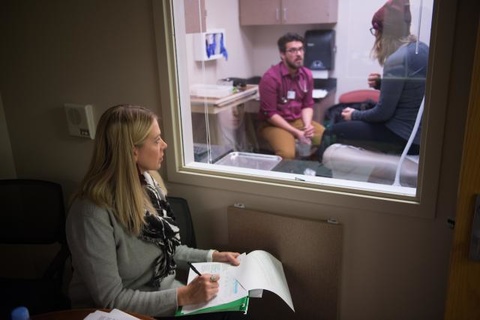
New collaboration brings theater students into nurse-training scenarios for real-life learning
By Lynn Anderson Davy | Iowa Now | 11/16/2017
The 16-year-old patient was clearly uncomfortable. Seated on the examination table, she twisted a strand of hair around her fingers and stared at the floor. Seated nearby was James Kinney, a University of Iowa nursing student whose job it would be to identify the teen’s hidden health issue.
Going into the exam, Kinney’s only information about his patient was her weight, height, blood pressure, and vaccination history. Kinney was understandably nervous about the challenge, but so too was his patient—and by design. She’s being played by UI theater student Catie Councell.
“Well, first, I want to reassure you that everything we discuss here today is confidential,” says Kinney, a Doctor of Nursing Practice (DNP) student in the UI College of Nursing. “There’s no judgment.”
“Um, OK,” says Councell, an MFA student in the UI Department of Theatre Arts, playing the role of Amanda Graziano, a soccer-playing 16-year-old with divorced parents and some confusion about her sexual orientation.
The exchange, and others like it, is part of a new collaboration between the UI College of Nursing and the Department of Theatre Arts that is helping students from both schools put classroom theory into practice. In the past few months, theater students have played the roles of a pregnant woman with preeclampsia and a little boy with pneumonia as part of regular nurse-training scenarios. In a recent scenario created specifically for students in the DNP program, theater students played teenagers with depression and substance abuse issues.
“Our goal with these exercises is to increase nursing students’ confidence and improve their skills when it comes to patient evaluations, especially difficult patient evaluations,” says Susan Van Cleve, professor and director of the UI’s Primary Care Pediatric Nurse Practitioner Program. “We want to make sure our students are competent.”
The opportunity to interact with actors who present authentic patient emotions and concerns in a supportive learning atmosphere is invaluable to nursing students, who are eager to put classroom theory into action. For theater students, the payoff is just as important: They are forced to come up with new lines in real time and with real people, not other trained actors.
Click here to read the full article as it appeared in Iowa Now
# # #